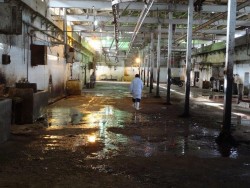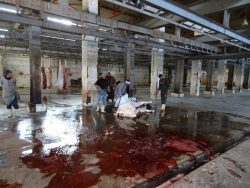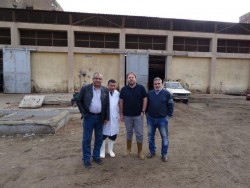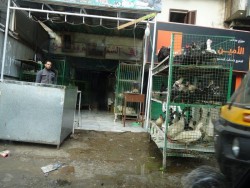An Eyes on Animals team just returned from a 5-day mission in Egypt. In October 2015 an Egyptian business man approached Eyes on Animals to request our help in his wish to improve several slaughterhouses in Egypt. Eyes on Animals decided to take a chance, and sent an expert on humane slaughter to Cairo to carry out an assessment of his plan, assess the situation on the ground (check on the slaughterhouses) and if possible carry out a training for staff and veterinary inspectors of the slaughterhouses.
It was concluded that the current slaughterhouses were not appropriate and the best is to start from scratch, with developing a brand new plant with state of the art equipment that takes high standards of animal-behaviour and meat quality into consideration. With a design that limits fright and suffering of animals as much as possible. Currently the plants near Cairo are large empty halls with drains where up to 300 people enter to slaughter their own animals. Conditions can be chaotic with sanitation and animal-welfare at times very poor. There are no facilities to move the animals or restrain them safely and correctly. Restraint is done by tying the animals up and several witnesses reported that in some instances large and wild animals have their ligaments cut to stop them moving.
The humane-slaughter expert hired by Eyes on Animals showed them footage showing much better handling methods and equipment. Educational material such as the OIE DVD on humane slaughter was also given to them. Despite meeting with the Head of Veterinary Department and the Director of Animal Slaughtering, it was not possible to arrange a last-minute training session during this visit of the veterinarian inspectors.
We will remain available to provide advice should the government agree to close some of the most unsuitable plants and provide land at a fair price, so that the businessman can build a brand new plant, that is designed to limit animal suffering and improve meat quality. Unfortunately the economic and political situation in Egypt is such that getting improvements into practice quickly is difficult. If we see that our help could make a difference later down the road, we will return.





